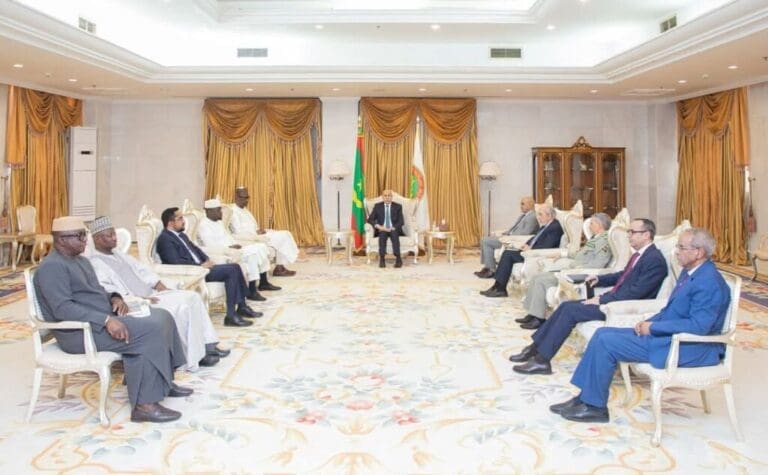Diplomatic activity has intensified in Mauritania as delegations from Senegal, Mali, and Gambia arrived in Nouakchott to discuss expulsions and regional cooperation on migration management.
In response to allegations of mass expulsions and degrading treatment of sub-Saharan migrants, Mauritania has engaged in discussions with its neighbours.
A high-level Malian delegation, including Minister of Malians Abroad Mossa Ag Attaher, Foreign Affairs Minister Abdoulaye Diop, and General Modibo Koné, Director of the National Security Agency (ANSE), visited Nouakchott. Their goal was to enhance bilateral cooperation and improve border repatriation coordination.
Senegalese Minister of Integration and Foreign Affairs Yassine Fall traveled to Mauritania on behalf of President Bassirou Diomaye Faye. She met with President Mohamed Ould Cheikh El Ghazouani and discussed concerns with the Senegalese community in Mauritania.
Following complaints from Gambian migrants about alleged inhumane treatment, President Adama Barrow sent Foreign Minister Dr. Mamadou Tangara to advocate for the protection of Gambian citizens.
Additionally, Gambia’s embassy in Nouakchott was instructed to provide better support and document distressed nationals.
Mauritania’s justifications on migration policy
While diplomatic efforts continue, Senegal’s honorary consul in Nouadhibou, Boughourbal Moulaye Abasse, emphasised the challenges Mauritania faces due to unprecedented migration pressure.
“A country of 4.5 million inhabitants now hosts 1.2 million irregular migrants, creating security and stability risks,” he stated in an interview with Senegalese media outlet Le Quotidien.
Mauritania has become a key transit point to Europe, particularly after the tightening of migration routes through Morocco and Senegal. Despite European Union support and Spanish police intervention, controlling the migrant flow remains difficult.
“Those without proper documentation whether Senegalese, Malians, or Burkinabè face deportation,” he explained.
Call for a coordinated regional response
The Senegalese honorary consul urged for a structured interstate cooperation, with a dedicated migration management budget.
“We need clear conditions for repatriation and financial resources to support effective migration policies,” he stressed, warning of dire conditions for 30,000 migrants stranded in Las Palmas without aid.
While Mauritania justifies its security-based approach, ongoing talks with Senegal, Mali, and Gambia highlight the necessity for a regional framework to ensure a coordinated and humane response to migration challenges.
AC/lb/as/APA


